
Imbibing the Spriti of Sustainability
DCM Shriram
For DCM Shriram, the efforts to leave a meaningful and long-lasting impact come straight from the heart. With a legacy of building communities, the company promotes participation and harmony
The principle of giving back to the society stems from the visionary Sir Shri Ram. DCM, or Delhi Cloth and General Mills, was set up in 1889. More than a century later, after trifurcation of the DCM group, DCM Shriram Ltd was formed in 1990 and it remains committed to the cause of nation building and social responsibility. The company’s focus is on health, drinking water and sanitation, education, vocational skills and livelihood, environment sustainability and rural development.
“Our strategic business units nurture the rural communities through their CSR work in project villages across Kota and Jhalawar in Rajasthan, Bharuch in Gujarat and Hardoi and Lakhimpur in Uttar Pradesh. The company’s manufacturing facilities are also located in these areas and the proximity helps us to regularly monitor these programmes and interact with the beneficiaries, thus maximising impact,” says Ajay S Shriram, Chairman and Senior Managing Director.
Elucidating on the programmes, Vikram S Shriram, Vice Chairman and Managing Director, says, “The primary need is to create behaviour change among the rural communities around key aspects like health, education, gender and sanitation. To ensure sustainability, a sense of ownership among the beneficiaries towards the programme is inculcated, for which we have a strong team.”
“Employee volunteering is encouraged. Regular project assessment helps us identify the gaps and address them with due interventions,” say the two directors.
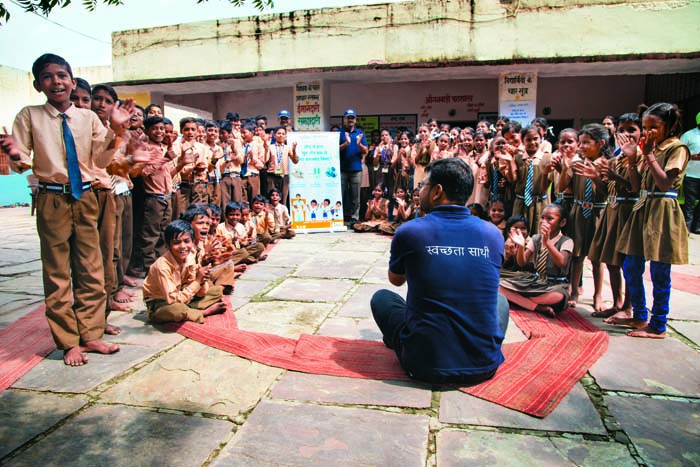
Swachhata Saathis from the company go to schools and educate children on sanitation
‘Shriram Swachhagraha’ (Swachha Vidhyalay Yojana)is a School Led Total Sanitation Programme that is not only upgrading sanitation infrastructure but also bringing about behaviour change in all 1,072 government schools of Kota district. The programme involves children, volunteering employees, teachers and the community.
There are many elements which make the initiative sustainable. 'Swachhata Saathis' or employee volunteers from the units visit the schools every week. The method is simple storytelling. “Haath, muh aur bum, bimari hogi kum”—the slogan cited by superhero Sonu has inspired the children in village Kishanpura, Kota district, and they now have a Bal Sansad or Child Cabinet comprising eight ministers.
Prime Minister Piyush Nagar is in standard 8th and he makes sure the children wear clean clothes, comb their hair, wash their hands, don’t waste water, give water to the plants, keep the toilets clean. The idea is simple: to induce children to become change agents and alter the attitudes of their family and peers about hygiene and safe sanitation. The school also has a soap bank, informs the headmaster. Each child brings a soap on his/her birthday so that the bank is never short. The School Management Committee appoints a green worker to clean the toilet.
All sanitary infrastructures have hygiene related messages painted in bright colours about basic practices like hand-washing with soap. The regular behaviour change programmes held at the school have brought about a significant shift in the habits of the school kids, which is evident in the children one can spot engaged in their routine sanitation practices. “The company got us to make a ‘Swachhata Kosh’ for raising voluntary funds for operations and the maintenance of toilets. Everyone, including the children, donates funds for this,” says Suresh Kumari Meena, Principal, Sr. Sec. School, Galana, Ladpura block, Kota District. She also informed that students are taking these newly-learnt values back home which are beginning to influence their parents and family members. A Swachhata Monitoring Board is updated after all the regular maintenance check-ups. The programme is being replicated in the government schools of Hardoi and Lakhimpur districts.
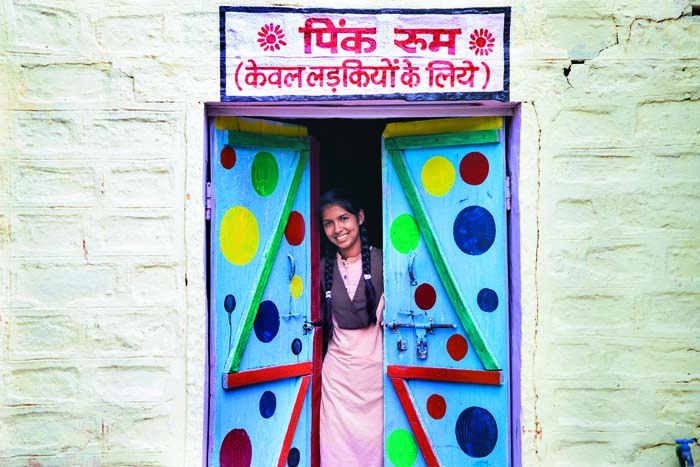
A first of its kind, the pink room is a bold step which gives dignity to the girls during painful menstruating days
Open Defecation Free Village: In
rural areas, open defecation has been a longstanding hazard, but the unit in
Bharuch went all the way to turn the village of Fulwadi into a cleaner place
and the women are all kudos for the company. With a population of close to
2,000, barely a handful of homes had toilets. But now with 267 toilets
constructed by DCM Shriram, the village is certified ‘Open Defecation Free’.
The toilets are a full unit with storage tanks and wash basins.
To bring
about the change, former gram panchayat member and social worker
Narendrabhai Sureshbhai Patel played a crucial role, fully supported by his
mother and other women in the village. “As I had worked with the company for
10 years, I approached them to give aid in this project,” he says. “Even
though some plots in the village are not registered, we ensured that toilets
were made for them as well.”
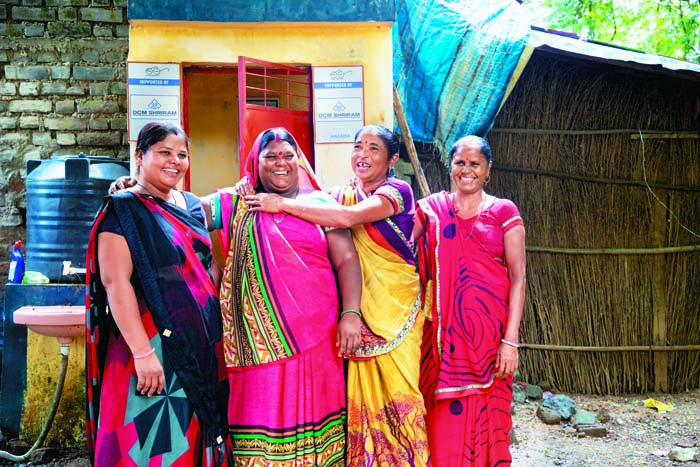
With a toilet in every home, the village of Fulwadi has many happy women, giving them dignity and comfort
“We are saved the tough task of going out at odd hours.During the monsoon, there would be many insects and creepy crawlies. Mosquitoes and flies buzzed over the dirty areas. For menstruating girls, pregnant women and mothers with small children, this has been a welcome move. The sick and the elderly have benefited immensely,” say a group of ladies, supported by their sarpanch Savitaben. ASHA worker Kailashben went to every home to convince the families. The champion of this cause, Sushilaben Babubhai Patel is always stopping people from going out. Now, they keep the toilets clean and follow the instructions for good hygiene that are imprinted on a tile plastered in the wall.
Pink Room: For girls in rural areas, menstruation means shameful days with pain and unease writ large, as it is only talked about in hushed tones. Consequently, it led to decreased attendance of girls in schools and in some cases, even dropouts. But DCM Shriram has addressed this issue with colour. In the Government Senior Secondary School, Arandkheda, Ladpura block, Kota District, it has constructed a pink room with a bed, wall paintings, pads.
A survey had revealed that sanitary pads were littered and attendance would go down due to menstruation. The subject of menstruation remained a social taboo and nobody addressed or informed the girls about proper hygiene practices. The girls never discussed it until an awareness session was held in the school with the principal Indu Hada supporting this move. The girls were then provided information on monthly menstrual cycles and practical demonstrations on hygiene practices were also conducted. Two brave young girls, Kritika Gautam and Kanishka approached their physical education teacher Neetu Laxkar, requesting for a place to rest during menstruation. An incinerator will soon be put in the Pink Room for disposal of sanitary pads. Not only has attendance gone up, the boys too have been sensitised about this.
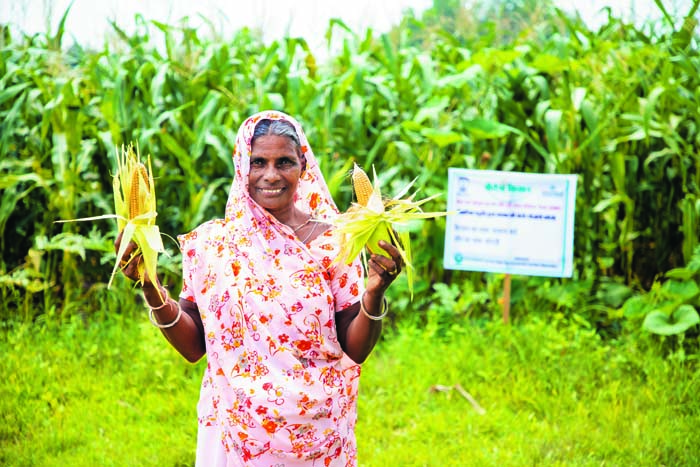
Fifty-year-old Kamla Bai, a farmer of Jhalawar district, has been getting a good yield and income after her trainng
Jeetega Kisan: DCM Shriram’s unique agriculture skilling project is being implemented in Kota and Jhalawar. The programme aims to train farmers to adopt modern agricultural techniques, enhance productivity, reduce cost of cultivation and cultivate cash crops relevant to nearby markets. Demo fields are used for creating better understanding among farmers. Encouraged by the results of improved agricultural practices in demo fields, Farmer Interest Groups (FIGs) are motivated to follow them. In three clusters of Kota district, 46 groups have been formed with almost 900 farmers participating in the programme. Farmers are encouraged to grow fruits which lead to higher income and vegetables which offer daily income. They are taught to use fewer chemicals and turn organic.
Besides the wheat and soyabean grown in that belt, Rampal Meghbal of village Baniyani, Ladpura block, Kota district, has planted guavas and oranges. As the trees will start fruiting in three years, he is also planting cauliflower. Rampal’s entire clan tills the four bighas of land to get maximum returns from it . Other vegetables often grown are tomatoes, chillies, brinjal. Some farmers have gone into dairy farming.
Like Rampal, more farmers have seen better income and more yield. The journey of an enthusiastic 50-year-old Kamla Bai from village Kotdi in Jhalawar, is a classic case of women empowerment in the male dominated farming world. “I come from a traditional farming family. My husband passed away when I was 30. At that time, I had eight bighas of land and earned Rs 1 lakh per annum. I joined the project in 2017 and saw an increase in yield of soyabean. My son had to discontinue his studies after standard 8, but my daughter studied till graduation.
Now, I grow corn, vegetables and fruits. My income is Rs 5 lakh per annum. I have taken eight bighas more on lease.”
Shriram Krishi Vikas Programme (SKVP) helps the farming community in increasing their productivity and profitability. This is an integrated rural development programme, covering over 500 villages annually. The six-month programme is executed through Shriram Krishi Vikas Kendras (SKVK). This includes visits to agricultural universities, animal husbandry camps and interaction with experts. Activities include formation of groups, demos in the fields, introduction to inter-cropping techniques. The SKVKs also undertake supplementary income generation training in compost making, poultry farming, horticulture, cattle breeding, bee keeping, growing fruits and vegetables. Free soil testing is also done.
Project Meetha Sona is DCM Shriram Sugar’s unique initiative for sugarcane farmers, based on the key principles of Suitability, Scalability and Sustainability. It works by catalyzing behaviour change among two lakh farmers working across 1.65 lakh hectares of farmland in the catchment area of DCM Shriram’s four sugar mills in Uttar Pradesh. The project is a multistakeholder engagement running successfully in collaboration with IFC and Solidaridad, and also includes multilateral agencies, developmental institutions and service providers, to address specific issues in the entire value chain.
This significant community outreach programme directly benefits the livelihood of sugarcane farmers, who are trained on productivity enhancement and large-scale conservation of water resources. Farmers are provided free press mud for soil health improvement and 260 Apna Sewa Kendras have been set up to promote farm mechanisation among smallholders. Good agricultural techniques such as trash mulching, laser levelling, furrow and drip irrigation have not only increased yields but led to a saving of 275 billion litres of water in the past three years. Bio Control Labs have been set in two sugar units, Rupapur and Ajbapur, to assist farmers in controlling pest attacks while reducing their usage of chemical pesticides.
A sugarcane farmer in Hardoi, Satinder Pal trained with DCM Shriram four years back. He says “I practice drip irrigation, do crop rotation and use less pesticide. My yield has increased. I am able to grow mustard, masoor dal and potatoes as intercrops for our own consumption, besides sugarcane and corn.”
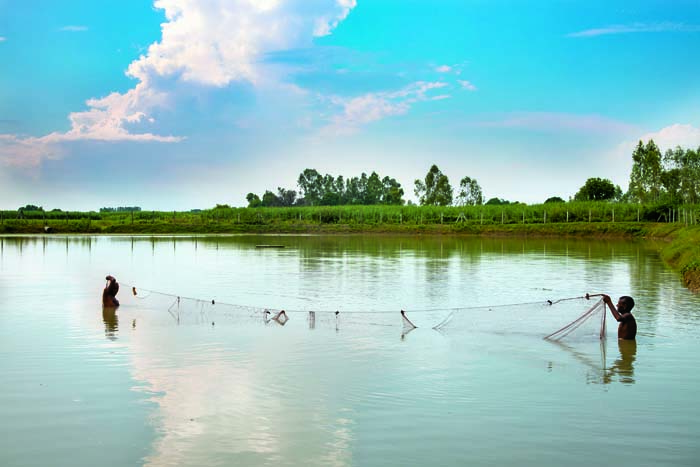
Bhagu Lal breeds more fish in this rejuvenated pond, Sadhinawan village, district Hardoi
To ensure availability of water in the
project areas, the company has constructed check dams, recharge wells, done
pond rejuvenation and desilting. In Kota and Jhalawar, three micro storage
tanks and two anicuts were constructed and one pond was renovated to support
the Mukhyamantri Jal Swawlamban Abhiyan (MJSA) of the Government of
Rajasthan. It is also supporting the repair and maintenance of Kota right
main canal.
Gazing at the large reservoir, spread across 50 acres, in
their village Semalhedi, four farmers are pleased to speak about how they
can now grow rice, besides wheat, as there is water for almost eight to nine
months.
Shreelal, Narayana Gujjar, Hukma Gujjar and
Govardhanji Gujjar look towards the green lands, saying that almost 300 bighas
are now irrigated. The rejuvenation of this pond has benefited almost 60 farmers
in this area. Desiltation and construction of a wall prevented the rain water
from running off.
Another happy soul is the sprightly 62-year-old Bhagu Lal,
in Sadhinawan village, district Hardoi. Since 1984, he has been breeding and
selling fish. He is in high spirits as the pond he has taken on lease for 10
years from the gram panchayat is full of water. “The company desilted, broadened
and deepened the pond. This helps in ground water recharge also.” He also has
plans to open a fish nursery soon as the pond is big enough.
The sugar units have also built one check dam and rejuvenated 68 ponds creating a surface storage capacity of 3.6 million cubic metres as well.
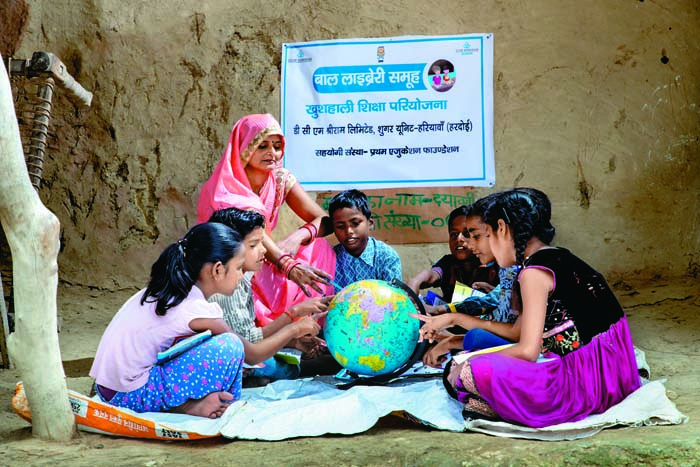
Khushali Shiksha: DCM Shriram has always been the forerunner in promoting literacy. The focus is on young learners (classes 2nd to 5th) to give them a strong foundation. In 2018-19, the programme impacted 5,800 children across 32 government primary school in Hardoi district. Computer classes for children in villages of Hardoi and Lakhimpur districts have been held.
The need for this intervention arose when a survey revealed that most children in grade 5 are unable to comprehend course material that is syllabus for grade 2. The dropout rate was also high at this stage. Hence, activity-based learning for basic arithmetic and reading was introduced with the help of an expert partner.
‘Khel-khel mein kamal’ is the slogan that the 24-day camp learning model is based on. The programme is succeeding in closing the gap between recommended learning that is the syllabus and actual learning by making the learning process enjoyable and participatory. The model involves parents, community, teachers and volunteers. Evening group classes are being promoted in the village under close supervision of a village elder. Among the volunteers is 18-year-old Laxmi Prajapati, who wants “to do BA and become a teacher too”. She also spends time learning and teaching the young ones.
The camp measures the child’s level on the basis of beginner, letter, word, para and story. And then groups are formed, comprising four to six students, and given an activity. Not just work sheets, they also have access to a globe and tablet. So they play video games like Dhoom, based on cricket, on the tablet, but it’s the sixes and fours that get them acclimatised to mathematics. Filling colours introduces them to the different colours on Earth. The progress of each child is mapped regularly.
The government school teachers are also supportive of the model. Indu Kanta and Poonam, teachers at the government primary school in Poora Bahadur, have found a change in the children after these activities. By the end of the camp, a child is able to form a sentence, pronounce names correctly and can understand a bit of the world around him.
Evening time is when the Bal Library Intervention comes alive. As mothers are the first teachers, help is taken to make one home a centre of peer learning. The children spend an hour every evening here to do more activities which are given by the executing partners. This model is replicated every few metres in the village, which makes every evening buzz with knowledge-based activities. Dayawati is one proud mother of Poora Bahadur village. She leads an intervention programme and her son Nikhil is the Prime Minister in the school's Bal Sansad. She has studied till standard 8. The globe and tablet are popular learning tools.
Besides this, the company has instituted scholarship programmes, built infrastructure and a school for students up to class 12th at Nimoda Hariji in Kota. In Bharuch, the company funded a degree college and has instituted a scholarship programme for primary school students in the villages around its facility.
Jagdish Chandra, Dairy Farmer
Tumariya Khedi Village, Jhalawar District
He trained in dairy farming, besides farming, for additional income.
"I went
to Dahod in Gujarat to see a model dairy farm and purchased four buffaloes of
Murra breed. I used to supply the milk to Saras Dairy in Gardankheri, but have
opened my own dairy at Pirawa now."
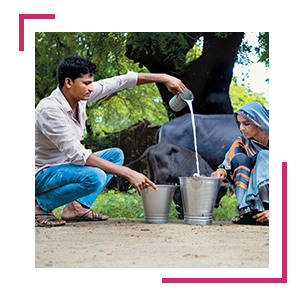
Anjali Mishra, Tailoring
Lakhimpur District
After passing out in 2017, the young mother opened her own business.
"I even
stitch my baby’s clothes. as she needs many. I also make a good amount stitching
for others. Now, I can make the latest fashion kurtis too."
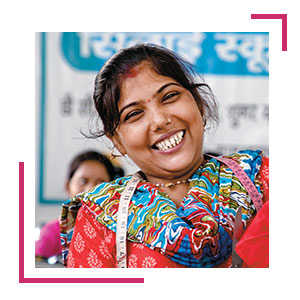
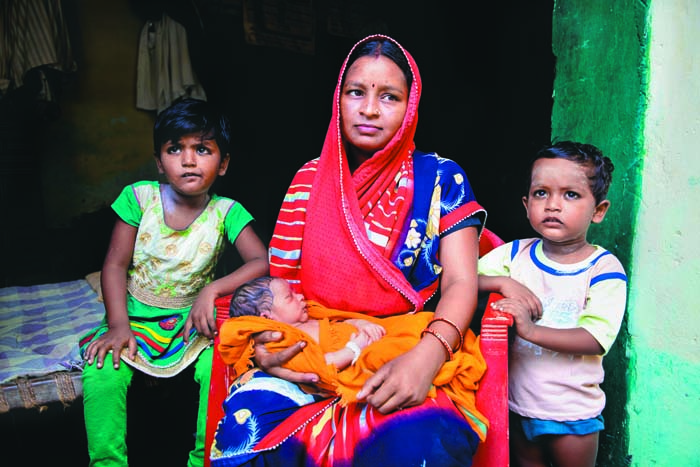
Khushali Sehat: Children, women and men of all ages sat in the community hall of their village Nagla Ganesh in Hardoi district. Health cards were being made, blood pressure checked and routine medicines distributed. A low hemoglobin count was a cause of concern for most. DCM Shriram uses technology to promote doorstep delivery of health services.
A special Chikitsak kit is provided to the communities which helps in checking and generating on-the-spot reports for ECG, pulse recording, digital monitor for recording blood pressure and undertaking haemoglobin test. The purpose of this kit is to perform crucial health tests at the village-level and provide an early solution.
While the minor issues are handled immediately, the more serious ones are referred to a nearby government hospital. Emergencies are taken care of on the spot. The sarpanch, Rita Devi, is happy as the village is on progress mode.
Running since 2006, Khushali Sehat supports the government’s programmes on vaccination, hospital delivery and nutrition in 40 villages around the sugar units. In 2018-19, Khushali Sehat benefited 35,000 families of 40 villages. Among them were 600 pregnant women, nearly 1,000 infants and 3,000 adolescent girls.
The programme is focussed on immunisation, institutional delivery and sanitation. It has helped improve maternal and infant health in the villages. Chandani, an ASHA worker who was earlier part of the team that began the mobilisation and sensitisation process, says, “Women were fearful and they refused to come out in the open. Whenever we would invite people for joint meetings, most wouldn’t turn up. It took some weeks and then we managed to get adolescent girls to come for meetings too. Sandhya Gupta, who is a village-level worker and also part of the DCM Shriram team, helped a lot.” Both men and women are called for awareness sessions on nutrition and healthcare.
Pregnant mothers are checked on a weekly basis and informed about the benefits of institutional delivery. And a case in point is 25-year-old Rinki, who recently gave birth to a girl. This is her third child and she is happy to have learned about the hospital. “My mother-in-law did not approve of this, but the workers explained the benefits to her.” As her two older children were born at home, she is happy to have been in the hospital. “I got better care and easier delivery.” New mothers get special care for 42 days after delivery. “She is guided on food, infant care,breast feeding and cleanliness,” says Mamta Devi, the ASHA worker in Nagla Ganesh.
In village Hariyawan, Uttar Pradesh, Puneet Kumar Mishra, gram pradhan pratinidhi, considers the water ATM a boon. The village did not have access to safe drinking water as “the TDS levels are as high as 500”. Calling this ‘any time water’ he says that water borne diseases have been minimised ever since people have started taking water from the ATM. DCM Shriram also gave us a computer, a public announcement system, built the school infrastructure and we have a smart classroom as well."
Annual ‘eye camps’ for cataract surgery have also been organised and have benefited more than 1,400 villagers every year. Awareness sessions on AIDS have been held, primarily for transporters and truckers. Not just people, DCM Shriram has been doing its bit for the planet too. In the last 12 years, over 75,000 tree saplings were planted at Bharuch and over 5, 00,000 in the rocky terrain of Kota. And the wheel keeps moving as the journey to winning hearts is an endless one.




